布鲁克林有棵树 A Tree Grows in Brooklyn
美式发音 适合精读
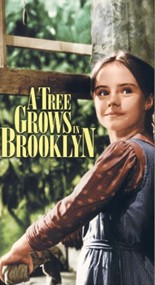 女孩弗兰西来自布鲁克林贫民区,母亲靠做清洁工来养活全家,父亲贪恋于酒精。弗兰西和弟弟从小便靠捡破烂来换取微薄的零用钱。她熟悉每种废品的价格,也知道如何买到完整的廉价发霉面包。然而每到周末,她都会去图书馆,她想把那里所有的书从A到Z都一一看过。星期天下午,她最爱在家里太平梯上,藏在树荫里看书。弗兰西体味着成长的艰辛:家境的贫穷、同学的歧视、社会的不公……然而她始终像布鲁克林的“天堂树”一般,出身、成长于贫民区,却奋力成长,坚毅不拔。
女孩弗兰西来自布鲁克林贫民区,母亲靠做清洁工来养活全家,父亲贪恋于酒精。弗兰西和弟弟从小便靠捡破烂来换取微薄的零用钱。她熟悉每种废品的价格,也知道如何买到完整的廉价发霉面包。然而每到周末,她都会去图书馆,她想把那里所有的书从A到Z都一一看过。星期天下午,她最爱在家里太平梯上,藏在树荫里看书。弗兰西体味着成长的艰辛:家境的贫穷、同学的歧视、社会的不公……然而她始终像布鲁克林的“天堂树”一般,出身、成长于贫民区,却奋力成长,坚毅不拔。
“There’s a tree that grows in Brooklyn. Some people call it the Tree of Heaven. No matter where its seed falls, it makes a tree which struggles to reach the sky. It grows in 1)boarded-up lots and out of neglected rubbish heaps. It grows up out of cellar 2)gratings. It is the only tree that grows out of cement. It grows lushly…survives without sun, water, and seemingly without earth. It would be considered beautiful except that there are too many of it.”
3)Serene was a word you could put to Brooklyn, New York. Especially in the summer of 1912. Somber, as a word, was better. But it did not apply to Williamsburg, Brooklyn. Prairie was lovely and Shenandoah had a beautiful sound, but you couldn’t fit those words into Brooklyn. Serene was the only word for it; especially on a Saturday afternoon in summer.
Late in the afternoon the sun 4)slanted down into the mossy yard belonging to Francie Nolan’s house, and warmed the worn wooden fence. Looking at the shafted sun, Francie had that same fine feeling that came when she recalled the poem they recited in school.
This is the forest primeval. The murmuring
pines and the 5)hemlocks,
Bearded with moss, and in garments green,
6)indistinct in the twilight,
Stand like 7)Druids of eld.
The one tree in Francie’s yard was neither a pine nor a hemlock. It had pointed leaves which grew along green switches which radiated from the bough and made a tree which looked like a lot of opened green umbrellas. Some people called it the Tree of Heaven. It grew lushly, but only in the 8)tenements districts.
You saw a small one of these trees through the iron gate leading to someone’s yard and you knew that soon that section of Brooklyn would get to be a tenement district. The tree knew. It came there first. Afterwards, poor foreigners seeped in and the quiet old 9)brownstone houses were hacked up into flats, feather beds were pushed out on the window sills to air and the Tree of Heaven flourished. That was the kind of tree it was. It liked poor people.
That was the kind of tree in Francie’s yard. Its umbrellas curled over, around and under her third-floor fire-escape. An eleven-year-old girl sitting on this fire-escape could imagine that she was living in a tree. That’s what Francie imagined every Saturday afternoon in summer.
For Francie, Saturday started with the trip to the 10)junkie. She and her brother, Neeley, like other Brooklyn kids, collected rags, paper, metal, rubber, and other junk and 11)hoarded it in locked cellar 12)bins or in boxes hidden under the bed. All week Francie walked home slowly from school with her eyes in the 13)gutter looking for tin foil from cigarette packages or chewing gum wrappers. This was melted in the lid of a jar.
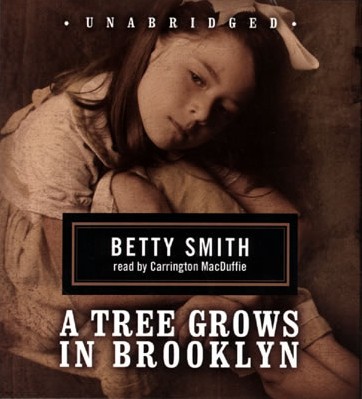
“在纽约的布鲁克林,长着一种树,有人称之为‘天堂树’。不管它的种子落到什么地方,都会长出一棵树来,向着天空,努力生长。这树长在四周围满木篱的空场子里,或是从无人留意的垃圾堆里钻出来。它从地下室的格栅里伸出,它也是唯一能在水泥地里长出来的树。它长得很茂盛……能在没有阳光、水分,甚至看起来没有泥土的地方生长。人们大抵都会觉得它挺漂亮的——只是,这种树太多了。”
“宁静”这个词用于纽约的布鲁克林恰如其分。尤其是在1912年的夏天。“沉静”这个词大概更好些。只是对布鲁克林的威廉斯堡不大合适。大草原的可爱,雪兰多的悦耳,用于布鲁克林都不合适。只能用“宁静”这个词,特别是在夏日的一个星期六下午。
下午的斜阳照在弗兰西·诺兰家爬满苔藓的院子里,把破旧的木篱笆晒得暖烘烘的。看着斜阳,弗兰西心头涌出一种美好的感觉来。这样的感觉,她回忆起一首诗歌时也有过。这诗她在学校里背诵过,是这样的:
这里是原始森林
松树和铁杉,低语阵阵
苔藓如须,翠绿满身
黄昏中伫立,依稀朦胧
如一个个德鲁伊高僧
弗兰西院子里唯一的那棵树既不是松树,也不是铁杉。树上的绿色枝条从树干向四周发散,枝条上长满了尖尖的叶子,整棵树看来如同无数撑开的绿伞。有人称之为“天堂树”。它长得很茂盛,而且只在居民区生长。
你会从通往人家院子的铁门中看见这样一棵小树,这时候你就知道,布鲁克林的这一带就要变成居民区了。树懂。树会打前站。到了后来,渐渐会有些贫穷的外国人跑过来,把平静破旧的褐砂石房子修理成平房。他们把羽毛褥垫沿窗户底框推出来晒。天堂树随之也长得郁郁葱葱。这种树就这习性。它喜欢穷人。
弗兰西院子里长的就是这种树。长到了她的三楼太平梯附近,树上的小“伞”一个个蜷曲过来。一个坐在太平梯上的十一岁女孩会觉得自己住在树上。夏天的每个星期六下午,弗兰西都是这么想象的。
弗兰西的星期六,是从去垃圾回收站开始的。和其他布鲁克林小孩一样,她和弟弟尼雷会在外头捡些布头、废纸、金属、橡胶等破烂,锁在地下室的箱子里或是藏在床底下的盒子中。从星期一到星期五,每天放学回家的路上,弗兰西会慢慢走,边走边看排水沟,希望找到烟盒的锡纸,或是口香糖的包装纸。回头她会将这些放在一个小罐子的盖子里头熔化。
翻译:未几
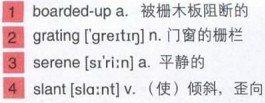

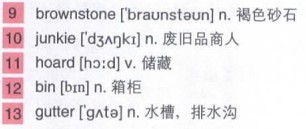
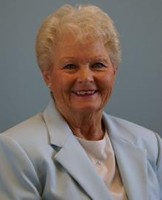 《布鲁克林有棵树》可以说是美国作家贝蒂·史密斯(1896—1972)的自传。来自穷苦德国移民家庭的她,借弗兰西表现了20世纪初纽约贫民热爱生活、永不言弃的顽强精神。而史密斯的一生,也是“知识改变命运”的最佳例证:从小在贫困中长大,最终靠自学上了大学,成为作家。而那些在大街上捡垃圾、拾铜皮的辛酸往事,到了成年,却成为其生命的财富。
《布鲁克林有棵树》可以说是美国作家贝蒂·史密斯(1896—1972)的自传。来自穷苦德国移民家庭的她,借弗兰西表现了20世纪初纽约贫民热爱生活、永不言弃的顽强精神。而史密斯的一生,也是“知识改变命运”的最佳例证:从小在贫困中长大,最终靠自学上了大学,成为作家。而那些在大街上捡垃圾、拾铜皮的辛酸往事,到了成年,却成为其生命的财富。
这本小说笔触清雅轻盈,如一幅恬淡的水彩画,即使是提及童年的困苦,也没有高尔基般的控诉和狄更斯式的阴暗,字里行间隐隐透着阳光般的宁静与温婉。此书自问世以来便屡获殊荣,不仅是亚马逊书店的“20世纪最佳青少年读物”,更被纽约公共图书馆选为“世纪之书”。如今美国的各大书店每逢假期,依然会将它与《小王子》、《夏洛蒂的网》等一起列为假期推荐必读。
